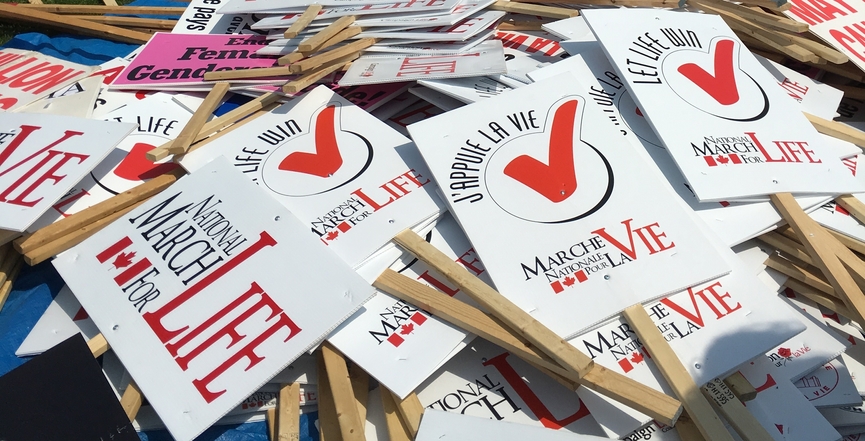Every May, anti-choice protesters arrive in Ottawa for the “March for Life” — the largest demonstration against the right to choose.
This year, COVID-19 has cancelled this in-person event, like many others. But what will it take to cancel the “March for Life” for good?
It may be easy to think about demonstrations like this one as being not a big deal — after all, it only happens once a year. We know that most Canadians are pro-choice — and most feel confident abortion is not under threat in Canada.
But “March for Life” events that happen in Canada and the United States share common goals, like ending access to abortion, that would result in taking away bodily autonomy and rolling back rights for many people in Canada.
Abortion isn’t the only target. Many supporters of “March for Life” support conversion therapy and oppose same-sex marriage — which has been legal for nearly 15 years. They oppose the right to die, and legislation that protects transgender people from discrimination. They are some of the same groups that fought against Ontario’s sex-ed curriculum, which had been updated to include topics on sexual orientation and gender identity.
To better understand how the intersection between the anti-choice movement and others pushes to roll back human rights, Action Canada reached out to Reverend Alba Onofrio, co-executive director of Soulforce, an LGBTQ+ non-profit organization that works to stop the ideological violence of Christian supremacy that is used to harm marginalized peoples. They explained that throughout the history of Christianity, there have been many different theologies on abortion and reproductive choice. But Christian supremacy is tied into the idea that to be Christian means to be anti-choice, and that it is morally righteous to harass and discriminate against people for exercising their right to choose: “This is not Christianity. This is about controlling bodies by punishing people who step out of line with patriarchy.”
This is what Soulforce fights against. They equip activists to stand against weaponized religion, provide tools on how to identify Christian-supremacist logic, and offer training on politics and theologies that puts people most directly harmed by Christian supremacy at the centre.
The push to rollback rights is far-reaching. Earlier this year, U.S. President Donald Trump was the first president to speak at a March for Life event in Washington D.C. At the same time, governments in some states like Texas, Ohio and Alabama are using the pandemic as an excuse to crack down on access to abortion services.
When rolling back rights is being validated by the head of state, it isn’t just a harmless march.
Many Canadians might think this could not happen here. During this pandemic, governments across Canada have expressed that abortion is essential health care, after all. But across Canada, we’ve recently seen trial balloons of anti-choice activism popping up in private members’ bills, like Bill 207 in Alberta last year, and in conversations about “re-opening the abortion debate.”
And we are far from immune to misogyny, homophobia and transphobia. Every six days, a woman in Canada is killed by her intimate partner. Hate crimes and violence against people because of their sexual orientation and gender identity is on the rise.
We need to come together and understand that it’s not only about reproductive rights during March for Life or LGBTQ+ rights during Pride. It’s not just about Ontario’s sex-ed curriculum or Alberta’s conscience rights bill. This is everybody’s fight. Christian supremacy creates myths about what is good and what is bad, and uses those myths to justify marginalization so that violence against certain people is seen as morally acceptable.
If you care about the rights of LGBTQ+ people and ending homophobia, this is your fight. If you care about the rights of children to learn about healthy relationships and consent in schools, this is your fight. If you care about ending gender-based violence, this is your fight.
Here’s what you can do: support accurate, evidence-based information about reproductive and sexual health care, including abortion. Learn what abortion access and sex-ed really look like in your community. Support bubble zone laws in your area and other measures that protect people seeking out this essential health care. Stay informed about what anti-choice and Christian-supremacist groups are doing in your local politics — and be ready to tell your members of Parliament to protect human rights.
Sandeep Prasad is executive director of Action Canada for Sexual Health and Rights and Reverend Alba Onofrio is co-executive director of Soulforce. Learn more about Christian supremacy and Soulforce here.
Image: Ross Dunn/Flickr



